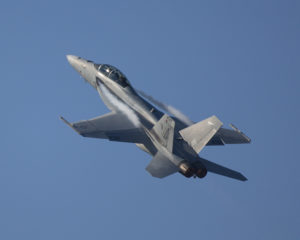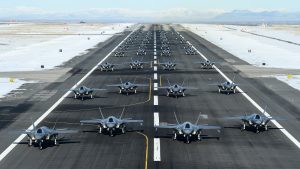The government of Canada confirmed it has rejected Boeing [BA] as a finalist in the government’ project to replace its 76 aging CF-18 Hornet fighters.
The government is seeking to acquire 88 new fighter jets for the Royal Canadian Air Force (RCAF) in a competitive process and on Dec. 1 it announced only Sweden’s
Saab, offering the Gripen E, and Lockheed Martin [LMT], pitching the F-35, are the two remaining bidders eligible under the Future Fighter Capability Project (FFCP) procurement process.
“Proposals were rigorously assessed on elements of capability, cost and economic benefits. The evaluation also included an assessment of economic impact,” Canada’s procurement agency Public Services and Procurement Canada (PSPC) said in the announcement.

The Canadian Press first reported last week that Boeing was told its bid did not meet the government’s requirement.
PSPC said in the coming week Canada will finalize next steps for the process. Based on further analysis of the remaining bids, the next steps “could involve proceeding to final negotiations with the top-ranked bidder or entering into a competitive dialogue, whereby the two remaining bidders would be provided with an opportunity to improve their proposals,” the agency added.
Canada said it still intends to award a contract in 2022 with aircraft delivery as early as 2025.
In 2018, Canada announced five eligible suppliers to submit proposals for the FFCP as the U.K. and Airbus with the Eurofighter Typhoon, Boeing with the Super Hornet, France’s Dassault Rafale, Lockheed Martin with the F-35, and Saab with the Griper E (Defense Daily, Feb. 23, 2018).
However, Dassault withdrew in 2018 and Airbus withdrew in 2019, partially over demanding intelligence data sharing and interoperability requirements.
Canada initially released the final request for proposals (RFP) for the FFCP in 2019 (Defense Daily, July 24, 2019).
Last year, Boeing announced five partners in its Super Hornet bid, boasting various Canadian operations ready to support a potential win. The partners included CAE, L3Harris Technologies [LHX], Peraton, Raytheon Technologies [RTX], and General Electric [GE].

The RFP said 20 percent of the assessment would be based on economic benefits, one of the highest ever weightings to economic benefits to Canada, which may be related to a former dustup between the government and Boeing.
Canada originally planned to replace the CF-18s with the Lockheed Martin F-35, but Prime Minister Justin Trudeau’s 2015 campaign promised not to buy the aircraft and the government eventually started an open competition.
Then, in 2017, Canada planned to buy 18 Boeing F/A-18E/F Super Hornets as part of an interim move before running the full fighter replacement competition.
However, after Boeing started a trade challenge against Canada’s Bombardier in the U.S. over complaints it sold a commercial airliner at artificially low prices, the Canada government responded by replacing the Super Hornets with 18 used Australian F/A-18 Hornets (Defense Daily, Dec. 12, 2017).
The U.S. The International Trade Commission eventually found in favor of Bombardier and declined proposed U.S. duties on the company.